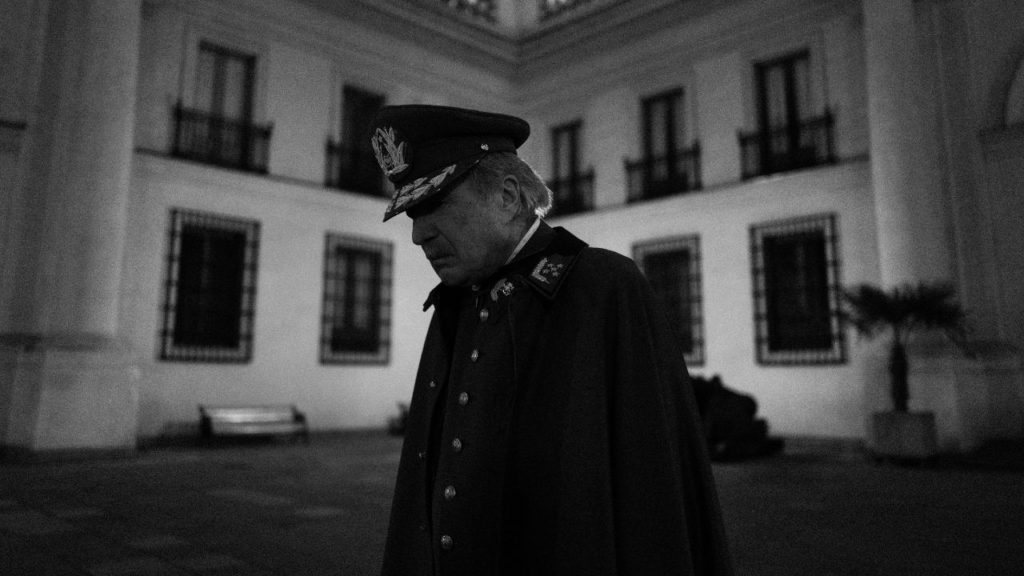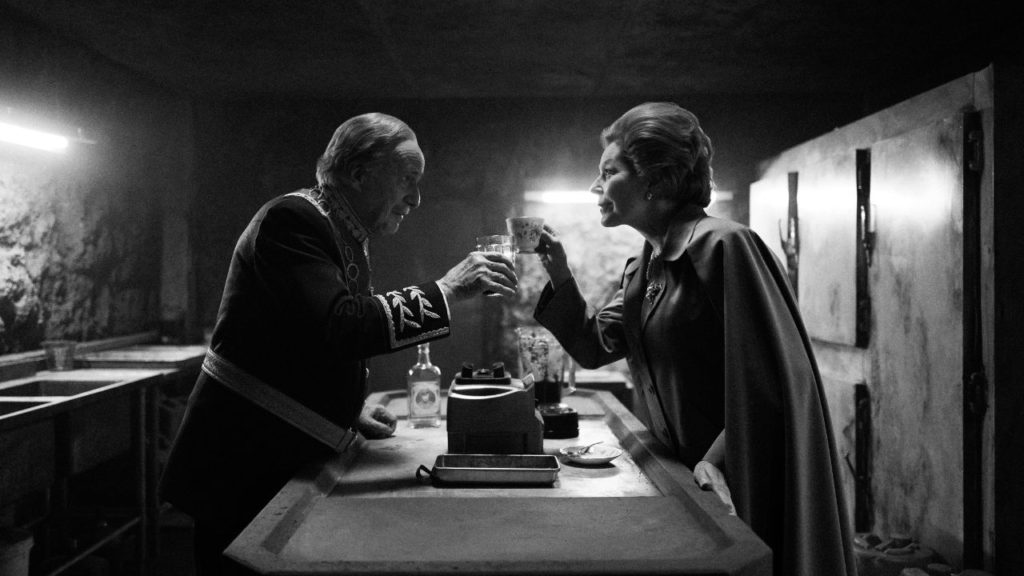Like the best gothic stories, Pablo Larraín’s El Conde is transgressively fluid. This Chilean film blends neo-gothic horror, political satire, family drama, and black comedy to offer biting commentary on South America’s darkest figure of fascism, Augusto Pinochet. He may have died in 2006, but Pinochet still looms large over Chile, and his brutal regime’s legacy continues to haunt the country.
This much is evident in El Conde, which partly utilizes a documentary style to present Pinochet as man and monster. The film imagines a humorous, fascinating, and surprisingly plausible alt-history of his life and “death” as a vampire. Larraín tracks Pinochet’s childhood as an orphan in France, to becoming a military dictator, and a distant father to his children.
Bring Me the Head of Marie Antoinette

In his youth, Pinochet served in Louis XVI’s army. Viewers learn that Pinochet’s hatred for people’s revolutions stems from watching his beloved king and queen beheaded by French commoners. Later, he returns to the execution site to reverently lick the blood-soaked guillotine, and, like some deranged fan-boy, he keeps Marie Antionette’s head as tribute.
From there, Pinochet swears to destroy all revolutions, and he is insidiously present during key historical events throughout the world. The film attributes the lasting political instabilities in Algeria and Haiti to Pinochet’s unseen machinations. Tellingly, Pinochet ultimately settles in Chile, “a country without a king.”
It’s clear that Larraín’s film version of Pinochet chose Chile from a buffet of politically unstable nations because he could position himself there as a paternalistic presence in a country of “fatherless peasants;” its population ripe for devouring. The film has fun at his expense, deriding Pinochet’s militaristic fashion sense as “a pimp in the hide of a banana republic mafioso.”
I Vant to Suck Your Blood

Sartorial satire aside, there’s something deeply disturbing about watching a desiccated, elderly Pinochet donning his military uniform and taking flight to hunt his own people each night. Gliding silently over the modern skyscrapers of downtown Santiago, his commander’s cape billowing behind, Larraín merges the iconography of Superman and Nosferatu to chilling effect.
This effect is extended by the seemingly incongruous and slapstick visual juxtapositions of the mundane with the monstrous, of the domestic with graphic gothic horror. Pinochet butchers his victims with a ceremonial knife but uses a kitchen blender to puree their hearts. Accompanied by Vivaldi’s Cello Concerto in D minor playing in the background, he chugs these blood smoothies like a frat boy.
The film’s narrator wryly observes the flavour profile of different nationalities. She considers the blood of the English superior (although it becomes later apparent that she’s an unreliable and biased narrator) and criticizes the blood of South Americans as a “plebian bouquet,” doubtless flavored so by their bitter class struggles. Ironically, Pinochet is democratic in his diet. He’ll eat anyone, young or old, rich or poor.
Just as Pinochet the count sucked his countrymen dry financially and literally, in his old age, his grown human children intend to do the same to him. Their hunger for his wealth makes one wonder whether the Pinochet family is predatory or actually parasitical.
Keep Carmen Carry On

When Carmen, an accountant-exorcist-nun (yes, all three), comes to sort through the family’s finances, she’s stunned by the dissonance the rich have from reality. Pinochet’s children justify that “all generals have the absolute right to ransack” and claim their family fortune is tiny compared to the Marcos dynasty.
That Carmen’s later attempt to exorcise the count’s unholy nature fails is perhaps a bleak reminder that fascism, much like the undead, is relentless and restless; it may disappear for a while, but it rises again in another form to afflict another generation. And fascist leaders like Pinochet rarely operate in a vacuum.
Arguably, the film’s best twist is the surprise revelation of the unnamed narrator’s true identity. The hints are plentiful: she’s an English Conservative who speaks with a trademark slow cadence. Oh, and she waged a war in the South. There really was no alternative for her. So, it makes perfect sense why this particular leader supported Pinochet’s bloodthirsty regime.
This revelation makes one wonder which other world leaders are monsters. El Conde uses the vampire as a metaphor for how political elites, no matter their creed, have no qualms about feeding upon their people. You don’t need to know much about Chile’s history or the geopolitics of South America to enjoy El Conde. Its raw anger towards a corrupt leader is palpable, and the film’s commentary is something Malaysian viewers can find enjoyable and relatable.









Follow Us